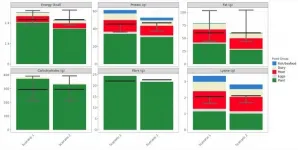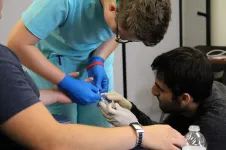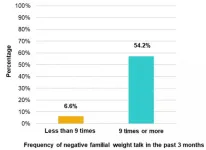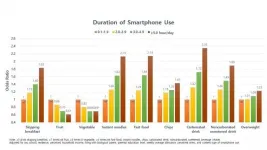Two-thirds of women don't meet criteria to discontinue cervical cancer screening
Inadequate screening for older women may contribute to high cancer rates and mortality
2021-06-07
(Press-News.org) BOSTON - Current guidelines recommend stopping cervical cancer screening at age 65, but women over age 65 make up over one in five new cervical cancer diagnoses, and are twice as likely to die after a cervical cancer diagnosis compared to younger women. New research from Boston Medical Center found that fewer than one in three women aged 64 to 66 met the criteria to discontinue cervical cancer screening while looking at patients with both private insurance and from a safety-net hospital setting. Published in Gynecologic Oncology, researchers found that even among women with 10 years of continuous insurance coverage, 41.5 percent did not qualify to end screening and most women did not receive adequate screening in the ten years leading up to this important screening decision.
The majority of women aged 65 and older may be at risk for cervical cancer due to inadequate screening or preexisting high-risk conditions. Study findings show that up to 20 percent of women reported a medical condition or a history of screening abnormalities that make this screening necessary beyond the age of 65. This highlights the need to educate patients and healthcare providers on the importance of ensuring adequate cervical cancer screening at ages 55 to 65, and also on high-risk conditions that necessitate screening beyond age 65. When data are adjusted for patient hysterectomies, the incidence of cervical cancer is highest among women ages 65 to 69 and remains elevated through age 85.
"Providers need to be aware that cervical cancer is a growing problem among women aged 65 and older, and that it is preventable," says Rebecca Perkins, MD, MPH, obstetrics & gynecology physician at BMC. "It's imperative for providers to proactively ensure that their patients receive adequate screening between the ages of 55 and 65 to decrease preventable cancers in women over the age of 65, and to make sure that their patients are adequately screened to be able to safely exit screening, if their health history qualifies."
The study data included 590,901 women aged 64 with employer-sponsored insurance enrolled in the national Truven MarketScan database between 2016 and 2018, and 1544 women aged 64 to 66 receiving primary care at a safety net health center in 2019, identified through an electronic health record query. Screening exit eligibility was determined using the current guidelines that include: no evidence of cervical cancer or HIV-positive status, no evidence of cervical pre-cancer in the past 25 years, and evidence of either a hysterectomy with removal of the cervix or evidence of fulfilling the screening exit criteria. The exit criteria are defined as two human papillomavirus (HPV) screening tests or HPV plus Pap co-tests or three Pap tests within the past 10 years without evidence of an abnormal result (screening with HPV testing or HPV/Pap co-testing provides more long term reassurance against cancer development than Pap testing alone).
Data from both the safety net hospital and national claims database indicated that fewer than half of women aged 64 to 66 had documentation of sufficient screening to fulfill the exit criteria. Guidelines specify that patients with immunosuppression, histories of abnormal results or cervical precancer, or cancer should continue screening. Current screening exit criteria are complex and require a detailed review of at least ten years of medical record documentation, which can create barriers to applying the guidelines to clinical practice.
"No patient should ever discontinue screening based on age alone without their healthcare provider completing a thorough review of their medical record," says Perkins, also an associate professor of obstetrics and gynecology at Boston University School of Medicine. "Improved cervical cancer screening in women 55 years and older may reduce cancer rates and mortality in women aged 65 and over."
Possible solutions to improve these rates include a Medicare-funded cancer prevention visit where the need for a cervical cancer screening is reviewed, and the optimization of electronic medical records to prompt a review of the cervical cancer exit screening criteria prior to a patient's screening discontinuation.
INFORMATION:
Funding for this study was provided by a Supporting Effective Educator Development (SEED) grant from the Department of Obstetrics and Gynecology at Boston Medical Center.
About Boston Medical Center
Boston Medical Center (BMC) is a private, not-for-profit, 514-bed, academic medical center that is the primary teaching affiliate of Boston University School of Medicine. It is the largest and busiest provider of trauma and emergency services in New England. BMC offers specialized care for complex health problems and is a leading research institution, receiving more than $166 million in sponsored research funding in fiscal year 2019. It is the 13th largest funding recipient in the U.S. from the National Institutes of Health among independent hospitals. In 1997, BMC founded Boston Medical Center Health Plan, Inc., now one of the top ranked Medicaid MCOs in the country, as a non-profit managed care organization. Boston Medical Center and Boston University School of Medicine are partners in Boston HealthNet - 12 community health centers focused on providing exceptional health care to residents of Boston. For more information, please visit bmc.org.
ELSE PRESS RELEASES FROM THIS DATE:
2021-06-07
GAINESVILLE, Fla. --- A more reliable way of estimating the size of megalodon shows the extinct shark may have been bigger than previously thought, measuring up to 65 feet, nearly the length of two school buses. Earlier studies had ball-parked the massive predator at about 50 to 60 feet long.
The revised estimate is the result of new equations based on the width of megalodon's teeth - and began with a high school lesson that went awry.
Victor Perez, then a doctoral student at the Florida Museum of Natural History, was guiding students through a math ...
2021-06-07
PHILADELPHIA (June 7, 2021) - An article written almost 30 years ago helps frame social constructs around the COVID-19 pandemic. By reviewing the essay, an historian of nursing at the University of Pennsylvania School of Nursing (Penn Nursing) extends that construct to include nurses and patients, delivering a local and personal meaning to the epidemic experience.
In an essay in the Bulletin of the History of Medicine, Julie A. Fairman, PhD, RN, FAAN, Endowed Chair, the Nightingale Professor in Honor of Nursing Veterans, and Professor of Nursing at Penn Nursing, reviews Charles Rosenberg's 1992 article about the AIDS epidemic. Using Rosenberg's theme, she further develops the ...
2021-06-07
Metal halide perovskites have been under intense investigation over the last decade due to the remarkable rise in their performance in optoelectronic devices such as solar cells or light-emitting diodes. Despite tremendous progress in this field, many fundamental aspects of the photophysics of perovskite materials remain unknown, such as a detailed understanding of their defect physics and charge recombination mechanisms. These are typically studied by measuring the photoluminescence - i.e. the emission of light upon photoexcitation - of the material in both the steady-state and transient regimes. ...
2021-06-07
Rockville, Md. (June 7, 2021) - Healthy habits are particularly important during pregnancy. Four new studies being presented at NUTRITION 2021 LIVE ONLINE look at how supplements, eating habits and physical activity can affect various aspects of health during pregnancy.
Prenatal supplements might influence bacterial composition of breast milk
Breast milk contains a unique mix of bacteria - known as its microbiota - that plays an important role in child health. In a new study, researchers from Purdue University examined whether diet or supplements taken prenatally affected the microbiota of breast milk in 771 mothers participating in the CHILD Cohort Study. The analysis revealed that supplements, but not dietary patterns, were linked with changes in human milk microbiota ...
2021-06-07
Rockville, Maryland (June 7, 2021) -- Only 5% of men and 9% of women are getting the recommended daily amount of dietary fiber, according to a study being presented at NUTRITION 2021 LIVE ONLINE. Insufficient fiber intake is associated with a higher risk of heart disease and diabetes, two of the most common diseases in the U.S.
"These findings should remind people to choose fiber-rich foods like whole grains, fruits and vegetables to reduce their risk for heart disease," said Derek Miketinas, PhD, RD, an assistant professor at Texas Woman's University, the study's ...
2021-06-07
Rockville, Maryland (June 7, 2021) -- Reducing food waste is crucial to our ability to feed the growing human population but will not fully solve the problem alone, according to a new study based on a computational model.
Researchers calculate that the world already produces enough protein and energy to feed 9.7 billion people--the projected population as of 2050--if food waste were cut in half. However, projections indicate global food production will still fall short in terms of micronutrients that our bodies need to stay healthy, including calcium, iron, vitamin E and others.
"Reducing food waste would give us enough protein and food energy to feed the 2050 population today--but not enough of the essential ...
2021-06-07
Rockville, Maryland (June 7, 2021) -- According to a new study, people who eat faster or take larger bites are more likely to eat more at a meal. The research, which is being presented at NUTRITION 2021 LIVE ONLINE, provides new insight into the factors that might contribute to overeating.
The study also adds more evidence that people eat more when given larger portions. The researchers found that study participants ate, on average, 43% more when the portion size of a meal was increased by 75%.
"Although studies have consistently found that people eat more when they are served larger portions, less is known about why this happens or why some people ...
2021-06-07
Rockville, Md. (June 7, 2021) - Superfoods like turmeric and honey have long been recognized for their ability to promote health and wellness. New studies being presented at END ...
2021-06-07
Rockville, Maryland (June 7, 2021) -- What we eat during childhood can affect the health of individuals--and populations--for years to come. As rates of childhood obesity continue to rise, five studies being presented at NUTRITION 2021 LIVE ONLINE bring new insights into the diets of children and teens around the world.
Families report substantial child weight gain during COVID-19
Researchers at Virginia Commonwealth University surveyed over 400 parents about their children's weight and eating habits before the COVID-19 pandemic and at two points during ...
2021-06-07
Rockville, Maryland (June 7, 2021) -- Even moderate smartphone use may influence teens' diet and weight, according to a new study of more than 53,000 Korean adolescents. Teens who used a smartphone for more than 2 hours per day were significantly more likely to eat more junk food and fewer fruits and vegetables than those spending less time on their phone. Teens spending more than 3 hours per day on a smartphone were significantly more likely to be overweight or obese.
"While earlier studies have shown that TV watching is an important factor that increases the risk of obesity in children and adolescents, little is known about the effects of modern screen time such as smartphone use on diet and obesity," said Hannah Oh, ScD, assistant professor at ...
LAST 30 PRESS RELEASES:
[Press-News.org] Two-thirds of women don't meet criteria to discontinue cervical cancer screening
Inadequate screening for older women may contribute to high cancer rates and mortality









